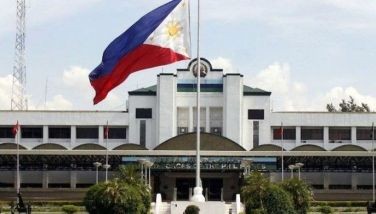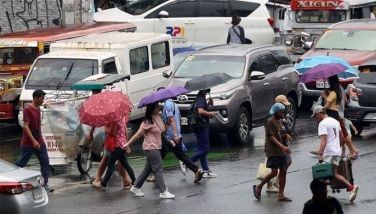RP natural gas project wins award in South Africa summit
September 3, 2002 | 12:00am
In the midst of the corruption, a ray of light.
The Philippines’ Malampaya Deep Water to Power Project was cited among the 10 winners of the World Business Summit Award for Sustainable Development Partnerships during the World Summit in Johannesburg, South Africa.
The Malampaya project was recognized for its effective multi-stakeholder partnerships between the Philippine government, Shell Philippines Exploration B.V. and non-government organizations (NGOs) in ensuring that the project does not harm the environment and local communities that surround it.
Over 120 partnerships from 37 countries submitted nominations for the award. The entries were judged using 17 indicators of sustainable development such as transparency, resource management, customer relations and public-private partnerships.
The United Nations Environment Program (UNEP) and the International Chamber of Commerce (ICC) sponsored the award.
"Even before the planning was done and pipelines were laid, there had been consultations with the communities," Environment Secretary Heherson Alvarez said. "There was already a forward quest for sustainable development."
Alvarez led the Philippine delegation to the World Summit and personally received the award last Aug. 31.
The Malampaya project, which was launched last year, involved the drawing of natural gas from one kilometer below sea level and laying a 500-km. underwater pipeline across some of the Philippines’ most environmentally sensitive grounds in the South China Sea and coastal areas of Mindoro island and Batangas province.
Once fully operational, Alvarez said, the Malampaya project is capable of providing 30 percent of the country’s energy requirements. This project can potentially reduce the country’s dependence on fossil fuels, such as petroleum.
According to Alvarez, President Arroyo is inclined to promote similar programs for harnessing and utilizing renewable resources and cleaner fuel for homes, motor vehicles and industries.
"There may be transitional costs to be incurred in this adjustment, but I am confident that these (costs) will (be) more than offset (by) the economic and health benefits we stand to reap," Alvarez added.
With Alvarez at the awarding ceremonies was Shell Philippines deputy managing director Facundo Roco, who credited the Malampaya project’s "sustainable partnerships" that won the award for the Philippines.
Roco said it would have been cheaper for Shell Philippines Exploration to build the natural gas pipelines inland. He added that Shell had decided to build the pipelines offshore at a higher cost to protect the rich biodiversity of Mindoro island, which is home to the tamaraw and other endangered species endemic to the area.
Using this approach, the Malampaya project also prevented the social dislocation of communities and the loss of biodiversity.
Roco added that the project’s proponents even went as far as to hold consultations with the New People’s Army (NPA) rebels operating in the province before the project was begun.
Other recipients of the World Business Summit Award for Sustainable Development Partnerships include an urban solid waste management partnership in the municipality of Calvia, Spain, which received 2 million tourists annually; an environmental diploma store concept by Kesko Corp., a retail association in Finland; E7 renewable electrification partnerships in remote villages of eastern Indonesia sponsored by power companies of G7 countries; and an entrepreneurial skills and environmental ethics program for grade school children, which has grown into a network of 179 schools involving 30,000 children.
Other award winners are: A "Newspapers That Know their Trees" initiative that allows readers to pinpoint the region and forest from which their newspaper originates by visiting a website; direct trade partnerships with 6,000 farmers in Indonesia and Guatemala by Forestrade; organic cotton and fair trade partnership between producers in India and Tanzania; Business Trust, a partnership between the South African government and local businesses, which seeks to create jobs in the tourism industry by reducing crime rates through establishment of closed-circuit television surveillance in South African Cities, and a sustainable palm oil partnership between Migros, Switzerland’s largest supermarket chain and NGOs.
The Philippines’ Malampaya Deep Water to Power Project was cited among the 10 winners of the World Business Summit Award for Sustainable Development Partnerships during the World Summit in Johannesburg, South Africa.
The Malampaya project was recognized for its effective multi-stakeholder partnerships between the Philippine government, Shell Philippines Exploration B.V. and non-government organizations (NGOs) in ensuring that the project does not harm the environment and local communities that surround it.
Over 120 partnerships from 37 countries submitted nominations for the award. The entries were judged using 17 indicators of sustainable development such as transparency, resource management, customer relations and public-private partnerships.
The United Nations Environment Program (UNEP) and the International Chamber of Commerce (ICC) sponsored the award.
"Even before the planning was done and pipelines were laid, there had been consultations with the communities," Environment Secretary Heherson Alvarez said. "There was already a forward quest for sustainable development."
Alvarez led the Philippine delegation to the World Summit and personally received the award last Aug. 31.
The Malampaya project, which was launched last year, involved the drawing of natural gas from one kilometer below sea level and laying a 500-km. underwater pipeline across some of the Philippines’ most environmentally sensitive grounds in the South China Sea and coastal areas of Mindoro island and Batangas province.
Once fully operational, Alvarez said, the Malampaya project is capable of providing 30 percent of the country’s energy requirements. This project can potentially reduce the country’s dependence on fossil fuels, such as petroleum.
According to Alvarez, President Arroyo is inclined to promote similar programs for harnessing and utilizing renewable resources and cleaner fuel for homes, motor vehicles and industries.
"There may be transitional costs to be incurred in this adjustment, but I am confident that these (costs) will (be) more than offset (by) the economic and health benefits we stand to reap," Alvarez added.
With Alvarez at the awarding ceremonies was Shell Philippines deputy managing director Facundo Roco, who credited the Malampaya project’s "sustainable partnerships" that won the award for the Philippines.
Roco said it would have been cheaper for Shell Philippines Exploration to build the natural gas pipelines inland. He added that Shell had decided to build the pipelines offshore at a higher cost to protect the rich biodiversity of Mindoro island, which is home to the tamaraw and other endangered species endemic to the area.
Using this approach, the Malampaya project also prevented the social dislocation of communities and the loss of biodiversity.
Roco added that the project’s proponents even went as far as to hold consultations with the New People’s Army (NPA) rebels operating in the province before the project was begun.
Other recipients of the World Business Summit Award for Sustainable Development Partnerships include an urban solid waste management partnership in the municipality of Calvia, Spain, which received 2 million tourists annually; an environmental diploma store concept by Kesko Corp., a retail association in Finland; E7 renewable electrification partnerships in remote villages of eastern Indonesia sponsored by power companies of G7 countries; and an entrepreneurial skills and environmental ethics program for grade school children, which has grown into a network of 179 schools involving 30,000 children.
Other award winners are: A "Newspapers That Know their Trees" initiative that allows readers to pinpoint the region and forest from which their newspaper originates by visiting a website; direct trade partnerships with 6,000 farmers in Indonesia and Guatemala by Forestrade; organic cotton and fair trade partnership between producers in India and Tanzania; Business Trust, a partnership between the South African government and local businesses, which seeks to create jobs in the tourism industry by reducing crime rates through establishment of closed-circuit television surveillance in South African Cities, and a sustainable palm oil partnership between Migros, Switzerland’s largest supermarket chain and NGOs.
BrandSpace Articles
<
>
- Latest
- Trending
Trending
Latest
Trending
Latest
Recommended































